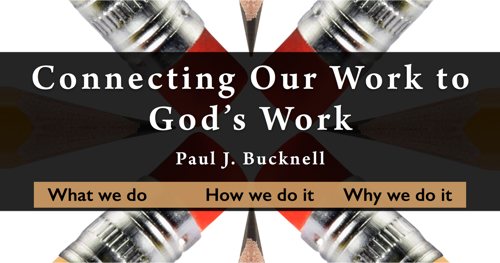
Connecting Our Work to God’s Work
Paul J. Bucknell
A new book is coming soon: Gaining Life Perspective: A biblical theology of success by Paul Bucknell
"I Just Deleted it!" || The Three Tools
Purpose
Provides three specific tools to help one analyze the value of one’s works in light of their temporary and eternal benefits. –This is part 2/2.
![]()
What we do
“What we do” helps define what is the work that is important to God. Sometimes, as mentioned above, we consider certain actions as valuable because of what people say or think about it.
However, only those things that God esteems and recognizes is important. If someone makes a derogatory joke against someone not present, instead of just laughing along with them and affirming their statement, you could respond with a good deed that God would esteem.
In this case your ‘work’ would be a ‘word’: “Yes, Joe sometimes makes mistakes, but I sometimes make those mistakes too. You know what helped me so much when I messed up was when Cecilia came over and spent a few minutes kindly pointing out my error and how to fix it.”
God then highly values those works that we do for Him. By understanding His will, we then can seek and find what He considers important for us to do in our lives, generally or specifically. We want to transform what will pass away–our will, by assuring that it is His will.
The question, then, is to ask, “To what degree am I focused on doing His work?” You will see why spending time with God in the morning is so important to help us discern what He wants for us each day!
How we do it
“How we do it” helps us investigate our attitudes–the way we do something. In other words, we can accept God’s will and even determine to do it, but treat the person with a poor attitude.
Maybe you got up and felt anxious about a relationship–what someone said to you on the phone. You were worried about what they thought about you and didn’t sleep well. You were going to avoid work but knew God would not want you to oversleep, and so got up and went to work on time. This is being faithful to one’s commitments to one’s job. God would value that.
However, when you went to work, or whatever you were busy doing, you were so occupied with yourself that you couldn’t focus on the people around you. Maybe your words were a bit terse or actions abrupt. So yes, you were at work, but you lacked that dependence upon on the Spirit of God for His strength and tenderness and so instead, like a crab, lived out of your selfish flesh.
The question we need to ask, then is, “Am I graciously, patiently treating people and properly carrying out my work?” We need to discern if our ‘work’ is being done in the flesh or from the Spirit.
This article and many others are part of our Digital Library #3 which helps mature Christians more effectively serve and nurture their spiritual lives.
Why we do it
“Why we do it” helps us analyze our motives–the hidden reason we do things. We could, perhaps, stop with the former point, but the tempter doesn’t stop!
In other words, we could have spent time with the Lord and decided what He wanted us to do was what we wanted to do. We could have checked our attitude, humbled ourselves and confessed our sins, and nicely treated everyone that day as Christ would have us do. It might have been a great day! But the Spoiler is seeking to trash all our efforts.
He doesn’t want anymore days like that so he comes and cleverly suggests a thought in our minds, “Oh, you are really the best person there. No-one else really cared for people.”
The Tempter will always attempt to distance our good works from God’s empowering so that we will focus on ourselves as the ‘hero’ or the person to be praised. Of course, from the beginning, we acknowledge that it was due to God’s grace that we could do those things with the right attitude and kindly treated people, but that all can be lost with the temptation to confuse our motives.
Only by clearly announcing our motives to glorify God in all we do, can we outright reject these subtle temptations to pride and idolatry, and therefore begin to see through the evil one’s schemes.
The question we need to ask our self is, “Why am I doing these kind actions?” This is our opportunity to direct our focus on God’s purpose and glory rather than stumble around in our minds and adore our efforts and words.
Conclusion
We will undoubtedly notice that we have failed at certain points while living out our lives–our work was wasted, but daily opportunities line our future path if we would but “walk in the Spirit”, assuring the actions, means, and purposes for which we carry out our lives matches God’s purposes.
Every moment, then, becomes a magical one in that God is totally involved in our lives. We are not consumed with getting our day done, but as God’s temple display His truth, love, and actions to others. This is our mission, our higher call, which affects whatever we find ourselves doing.

Simply by turning the focus around to do God’s will by His strength and for His glory our days can go from boring, tragic, and vain to exciting, God’s witness, God’s agent of love! These three phrases can help us to keep on track: What we do, How we do it, and Why we do it.
Life Application
What I do
I will be content with His purposes for me.
How I do it
I will seek His will and delight in it with all my heart and soul.
Why I do it
I will purposely give myself for God’s glorious purposes.
Tthis article concludes here! Check out these other articles:
Psalm 90:1-17 Participating in God's Work from a look at Moses' Life
'Participating in God's Work from a look at Moses' Life' traces the three stages of Moses' life in Psalm 90:1-17 . The third stage is where he met God and finally ...
An Ongoing Work: Restoration of Our Lives (3/3)
This article provides basic instruction on how to work with the Spirit of God in this ... This is part 3 of 3 of Restoration of Our Lives named 'An Ongoing Work.'
A Spiritually Balanced Life: Living a Spirit-filled life in a busy modern ...
In his mind work comes next. This is what takes up most his time and anyway, if he didn't work, he couldn't live and care for his family. We can see that with this ...
1 Corinthians 15:9-10 Bible Study Questions: God's Work in Our Lives
Bible Study Questions for 1 Corinthians 15:9-10 challenges us to reflect on our accomplishments in a proper and realistic way, giving full acknowledgment to ...










